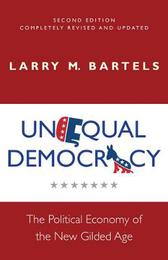
|
Unequal Democracy: The Political Economy of the New Gilded Age - Second Edition
Paperback / softback
Main Details
| Title |
Unequal Democracy: The Political Economy of the New Gilded Age - Second Edition
|
| Authors and Contributors |
By (author) Larry M. Bartels
|
| Series | Russell Sage Foundation Co-pub |
|---|
| Physical Properties |
| Format:Paperback / softback | | Pages:424 | | Dimensions(mm): Height 203,Width 133 |
|
| Category/Genre | Political economy |
|---|
| ISBN/Barcode |
9780691181073
|
| Audience | |
|---|
| Edition |
2nd edition
|
| Illustrations |
51 b/w illus., 53 tables
|
|
Publishing Details |
| Publisher |
Princeton University Press
|
| Imprint |
Princeton University Press
|
| Publication Date |
29 May 2018 |
| Publication Country |
United States
|
Description
An acclaimed examination of how the American political system favors the wealthy-now fully revised and expanded The first edition of Unequal Democracy was an instant classic, shattering illusions about American democracy and spurring scholarly and popular interest in the political causes and consequences of escalating economic inequality. This r
Author Biography
Larry M. Bartels holds the May Werthan Shayne Chair of Public Policy and Social Science at Vanderbilt University. His books include Democracy for Realists: Why Elections Do Not Produce Responsive Government (with Christopher H. Achen) and Presidential Primaries and the Dynamics of Public Choice (both Princeton). He is a trustee of the Russell Sage Foundation, a fellow of the American Academy of Political and Social Science, and a member of the American Academy of Arts and Sciences and the National Academy of Sciences.
Reviews"Winner of the 2009 Gladys M. Kammerer Award, American Political Science Association" "Winner of the 2009 Leon D. Epstein Outstanding Book Award, Political Organizations and Parties Section of the American Political Science Association" "[I recommend] Larry M. Bartels's Unequal Democracy. Especially at this time every thoughtful American needs to learn as much as possible about the relationship of politics to economics."---Bill Clinton, Daily Beast "[A] provocative new book by . . . Larry M. Bartels, one of the country's leading political scientists."---Dan Balz, Washington Post "Unequal Democracy makes the choice voters face clear: Democratic policies spread the wealth and Republican policies protect the wealthy."---Julian E. Zelizer, Huffington Post "Bartels is the political scientist of the moment."---Michael Tomasky, New York Review of Books "A short review cannot convey the rich variety of arguments and data Bartels deploys in making his case. . . . Bartels shows that social issues do not create as strong a headwind against class-based voting as is often assumed and that lower income voters do tend to vote Democratic while upper-income voters do tend to vote Republican. Unequal Democracy offers an important case for why this might be."---Robert Grafstein, Science "Obama can connect with voters on the economy by using history as a guideline. He should start by reading Unequal Democracy, by Princeton academic Larry Bartels."---James Carville, CNN "Extraordinarily insightful."---Bob Braun, Newark Star-Ledger "Unequal Democracy is a major landmark in political scientists' efforts to grapple with inequality."---Benjamin I. Page, Perspectives on Politics "[Bartels] is correct in drawing attention to the tension between the egalitarian values that Americans hold and their apparent toleration for growing economic inequality. And at every step of the argument, he defines and analyzes interesting and relevant evidence."---Richard R. John, Forum "Prodigiously researched and cogently argued, Bartels's timely work should interest academics and lay readers alike."---Blake A. Ellis, Journal of Southern History "The book is exemplary throughout in its transparency with regard to the data and Bartels's analytic strategy for using them, in its attention to alternative explanations for a given outcome, and in its balance between not over-reaching and asserting a clear, controversial, and important thesis. . . . Full of evidence, insights, and surprises. . . . The book is never less than provocative and is often revelatory."---Jennifer Hochschild, Perspectives on Politics "For a book targeted at both academic and nonacademic audiences, Bartels strikes a nice balance between exhaustive empirical rigor and accessibility. . . . Bartels gives us a wide-ranging framework for thinking about the ways that citizens interact with the political system, and in so doing maps an agenda for the next generation of research on American democracy in action."---Nicholas J. G. Winter, Public Opinion Quarterly
|